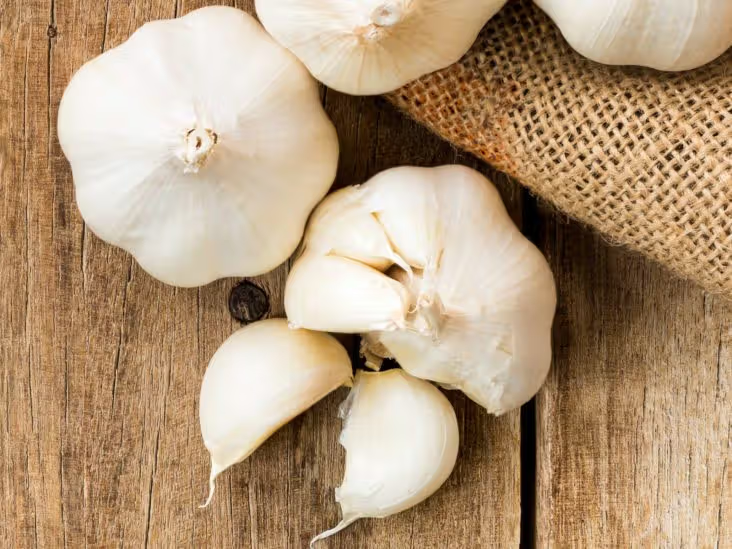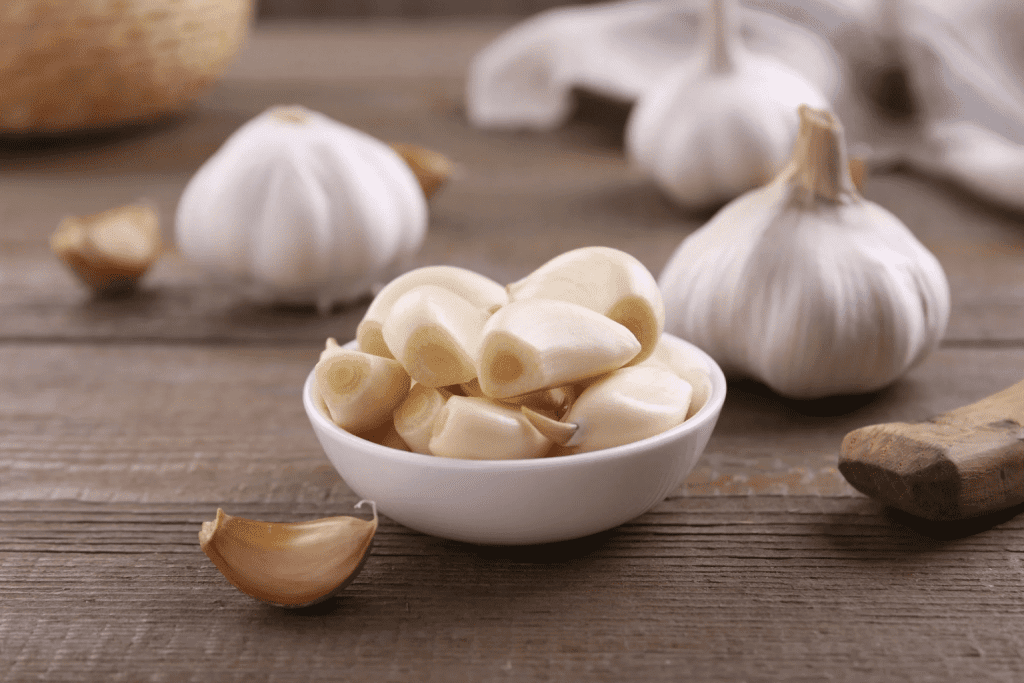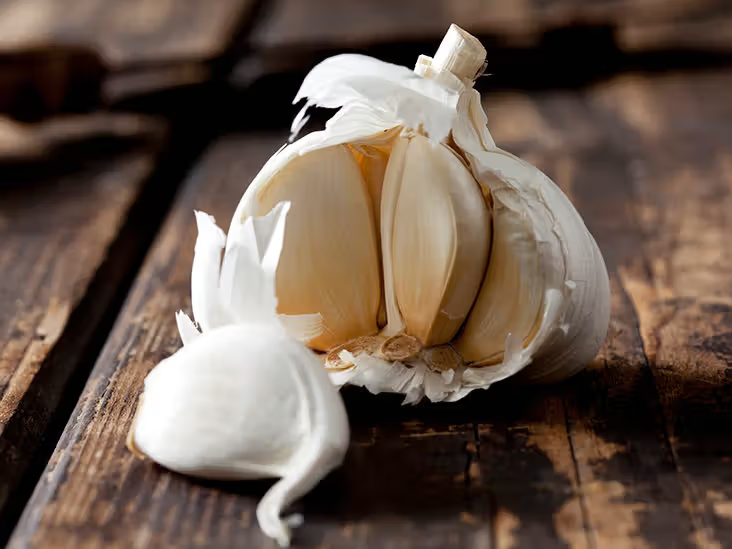Garlic has long been celebrated as a natural remedy with a variety of health benefits. Rich in allicin, a sulfur compound responsible for its distinctive aroma and many of its medicinal properties, garlic has earned a prominent place in both traditional medicine and modern health discussions. From boosting the immune system to promoting heart health, garlic has something to offer for everyone. But, as with all good things, moderation is key.
Let’s explore the incredible benefits of garlic, the potential risks of overconsumption, and how to incorporate it safely into your diet for optimal health.

The Health Benefits of Garlic
Garlic is more than just a kitchen staple; it’s a powerhouse of nutrients and compounds that support overall health.
1. Boosts the Immune System
Garlic has antimicrobial and antiviral properties that help strengthen the immune system. It’s packed with antioxidants that combat free radicals, reducing the risk of infections and supporting recovery during illness. Adding garlic to your meals can be a simple yet effective way to stay healthy during flu season.
2. Promotes Cardiovascular Health
Garlic’s potential to improve heart health is well-documented. It can:
- Lower Blood Pressure: Studies suggest garlic can reduce both systolic and diastolic blood pressure, particularly in individuals with hypertension.
- Reduce Cholesterol Levels: Garlic may help decrease LDL (bad cholesterol) while maintaining or slightly improving HDL (good cholesterol).
- Enhance Circulation: Its compounds improve blood flow, reducing the risk of blood clots and supporting overall heart function.
3. Reduces Inflammation
Chronic inflammation contributes to many diseases, including arthritis and cardiovascular conditions. Garlic contains anti-inflammatory compounds that can help alleviate inflammation and promote long-term health.
4. Rich in Antioxidants
The antioxidants in garlic protect cells from oxidative stress, which is linked to aging and various diseases. Regular consumption may reduce the risk of chronic conditions such as Alzheimer’s and certain cancers.
Potential Risks of Consuming Too Much Garlic
While garlic offers numerous benefits, excessive consumption can cause adverse effects.
1. Digestive Issues
Eating too much garlic, especially raw, can lead to bloating, gas, and diarrhea. These gastrointestinal discomforts are common signs that your body is struggling to process the high concentration of compounds in garlic.

2. Increased Risk of Bleeding
Garlic has natural blood-thinning properties. While this is beneficial for circulation, it can be risky for individuals on anticoagulant medications or those with bleeding disorders. Excessive garlic intake may exacerbate these risks.
3. Social Concerns: Bad Breath and Body Odor
Let’s face it—garlic breath isn’t pleasant. Overeating garlic can lead to a persistent odor that even the strongest mints can’t mask.
4. Allergic Reactions
In rare cases, garlic can trigger allergic reactions. Symptoms may include skin irritation, headaches, or difficulty breathing. If any unusual symptoms occur, it’s important to consult a doctor.
Signs of Garlic Overconsumption
It’s important to recognize when you might be overdoing it with garlic. Signs of overconsumption include:
- Nausea or vomiting
- Dizziness or headaches
- Stomach pain or cramps
- Increased bleeding (e.g., prolonged nosebleeds or cuts that take longer to clot)
If you notice these symptoms, reduce your garlic intake and monitor your body’s response.

The Ideal Garlic Intake for Health Benefits
So, how much garlic is too much? Experts recommend consuming 1 to 2 cloves per day. This amount provides the health benefits without the risks of overconsumption.
Cooking garlic before eating it can also reduce its potency, making it gentler on the stomach while still delivering its health-boosting properties.
How Garlic Helps Manage Blood Pressure
Garlic’s ability to lower blood pressure has been the subject of numerous studies.
The allicin in garlic relaxes blood vessels, improving blood flow and reducing strain on the heart. Although the effects aren’t as strong as prescription medications, incorporating garlic into a heart-healthy diet can have a modest, positive impact on blood pressure.
For best results, garlic supplements standardized for allicin content can offer a consistent dosage, but it’s always wise to consult a healthcare provider before adding supplements to your routine.
How to Safely Incorporate Garlic Into Your Diet
To enjoy garlic’s benefits without risking its side effects, try these tips:
1. Add Garlic to Your Meals
Cooking with garlic is one of the easiest ways to include it in your diet. Sauté it with vegetables, stir it into soups, or add it to marinades for a flavorful and healthy boost.
2. Use Garlic Powder or Supplements
If fresh garlic isn’t your thing, garlic powder or supplements can provide similar benefits. Choose supplements that specify allicin content for maximum effectiveness.
3. Combine Garlic with Other Healthy Practices
Pairing garlic with other heart-healthy habits, like eating a balanced diet, exercising regularly, and reducing salt intake, can amplify its benefits.

Alternative Natural Approaches to Heart Health
While garlic is a fantastic natural remedy, it’s not the only option for managing blood pressure and promoting heart health. Here are a few complementary strategies:
- Eat a Plant-Based Diet: Load up on fruits, vegetables, whole grains, and legumes.
- Exercise Regularly: Aim for at least 30 minutes of moderate activity most days of the week.
- Manage Stress: Practices like yoga, meditation, and deep breathing can lower blood pressure.
- Limit Sodium and Alcohol: Excess salt and alcohol can strain your heart, so moderation is key.
Conclusion: Balance Is Key
Garlic is a natural powerhouse with impressive health benefits, especially for heart health and blood pressure management. However, moderation is crucial to avoid potential side effects like digestive discomfort or bleeding risks.
By consuming 1 to 2 cloves daily and incorporating garlic into a balanced diet, you can enjoy its benefits safely. Remember to consult with a healthcare professional if you’re considering garlic as part of a treatment plan for specific health conditions.
Embrace garlic as a flavorful, health-boosting ally, and let it work its magic for your well-being.


